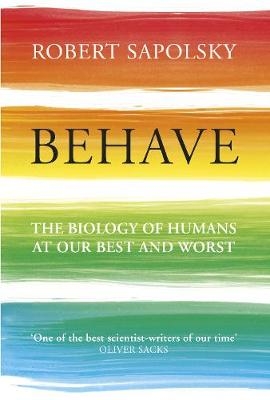
Behave
The Biology of Humans at Our Best and Worst
Seiten
2017
The Bodley Head Ltd (Verlag)
978-1-84792-471-1 (ISBN)
The Bodley Head Ltd (Verlag)
978-1-84792-471-1 (ISBN)
- Titel ist leider vergriffen;
keine Neuauflage - Artikel merken
Why do we do what we do? This book is at once a tour and a majestic synthesis of the whole science of human behaviour. Brought to life through engaging stories, it offers the fullest picture yet of the origins of tribalism and xenophobia, hierarchy and competition, morality and free will, war and peace.
'Awe-inspiring … the best scientific book written for non-specialists that I have ever read. You will learn more about human nature than in any other book I can think of, and you will be inspired' Henry Marsh, author of Do No Harm
A ground-breaking synthesis of the entire science of human behaviour by 'one of the best scientist-writers of our time' (Oliver Sacks) -- 'It’s no exaggeration to say that Behave is one of the best nonfiction books I’ve ever read' Wall Street Journal
'They should put Behave in hotel rooms instead of the Bible: the world would be a much better, wiser place' Kate Fox, author of Watching the English
Why do we do what we do? Behave is at once a dazzling tour and a majestic synthesis of the whole science of human behaviour. Brought to life through simple language, engaging stories and irreverent wit, it offers the fullest picture yet of the origins of tribalism and xenophobia, hierarchy and competition, morality and free will, war and peace.
Robert Sapolsky’s ingenious method is to move backwards in time from the moment at which a behaviour occurs, layer by layer through the myriad influences that led to it:
- We begin with the split-second reactions of the brain and nervous system…
- Then we consider our response to sight, sound and smell in the minutes and seconds beforehand…
- Next he explains the interactions of hormones, which prime our behaviour in the preceding hours and days…
- He proceeds through the experiences of adolescence, childhood and foetal development that shape us over our lifespans…
- And continues over centuries and millennia through the profound influences of genetic inheritance, cultural context and ultimately the evolutionary origins of our species.
Throughout, Sapolsky considers the most important question: what causes acts of aggression or compassion? What inspires us to terrible deeds and what might help foster our best behaviour?
Wise, humane, often very funny, Behave is a towering achievement, powerfully humanizing, that is unlikely to be surpassed for many years.
'Awe-inspiring … the best scientific book written for non-specialists that I have ever read. You will learn more about human nature than in any other book I can think of, and you will be inspired' Henry Marsh, author of Do No Harm
A ground-breaking synthesis of the entire science of human behaviour by 'one of the best scientist-writers of our time' (Oliver Sacks) -- 'It’s no exaggeration to say that Behave is one of the best nonfiction books I’ve ever read' Wall Street Journal
'They should put Behave in hotel rooms instead of the Bible: the world would be a much better, wiser place' Kate Fox, author of Watching the English
Why do we do what we do? Behave is at once a dazzling tour and a majestic synthesis of the whole science of human behaviour. Brought to life through simple language, engaging stories and irreverent wit, it offers the fullest picture yet of the origins of tribalism and xenophobia, hierarchy and competition, morality and free will, war and peace.
Robert Sapolsky’s ingenious method is to move backwards in time from the moment at which a behaviour occurs, layer by layer through the myriad influences that led to it:
- We begin with the split-second reactions of the brain and nervous system…
- Then we consider our response to sight, sound and smell in the minutes and seconds beforehand…
- Next he explains the interactions of hormones, which prime our behaviour in the preceding hours and days…
- He proceeds through the experiences of adolescence, childhood and foetal development that shape us over our lifespans…
- And continues over centuries and millennia through the profound influences of genetic inheritance, cultural context and ultimately the evolutionary origins of our species.
Throughout, Sapolsky considers the most important question: what causes acts of aggression or compassion? What inspires us to terrible deeds and what might help foster our best behaviour?
Wise, humane, often very funny, Behave is a towering achievement, powerfully humanizing, that is unlikely to be surpassed for many years.
Robert M. Sapolsky holds degrees from Harvard and Rockefeller Universities and is currently a Professor of Biology and Neurology at Stanford University and a Research Associate with the Institute of Primate Research, National Museums of Kenya. He is the author of The Trouble with Testosterone, Why Zebras Don't Get Ulcers (both finalists for the LA Times Book Award), and A Primate's Memoir. Sapolsky has contributed to Natural History, Discover, Men's Health, and Scientific American, and is a recipient of a MacArthur Foundation genius grant.
| Erscheinungsdatum | 26.05.2017 |
|---|---|
| Verlagsort | London |
| Sprache | englisch |
| Maße | 153 x 234 mm |
| Gewicht | 1165 g |
| Themenwelt | Sachbuch/Ratgeber ► Natur / Technik |
| Geisteswissenschaften ► Psychologie ► Allgemeine Psychologie | |
| Geisteswissenschaften ► Psychologie ► Biopsychologie / Neurowissenschaften | |
| Geisteswissenschaften ► Psychologie ► Humanistische Psychotherapien | |
| Naturwissenschaften ► Biologie ► Evolution | |
| Naturwissenschaften ► Biologie ► Humanbiologie | |
| Naturwissenschaften ► Biologie ► Zoologie | |
| ISBN-10 | 1-84792-471-9 / 1847924719 |
| ISBN-13 | 978-1-84792-471-1 / 9781847924711 |
| Zustand | Neuware |
| Haben Sie eine Frage zum Produkt? |
Mehr entdecken
aus dem Bereich
aus dem Bereich
wie Affekte innere Entwicklung ermöglichen
Buch | Softcover (2023)
Klett-Cotta (Verlag)
CHF 41,95
Buch | Softcover (2024)
Hogrefe Verlag
CHF 46,50


